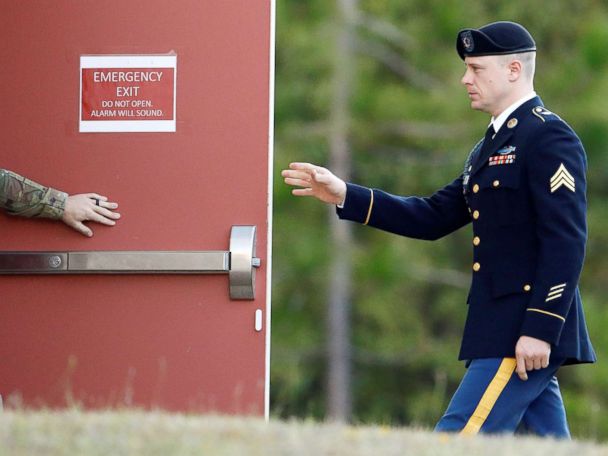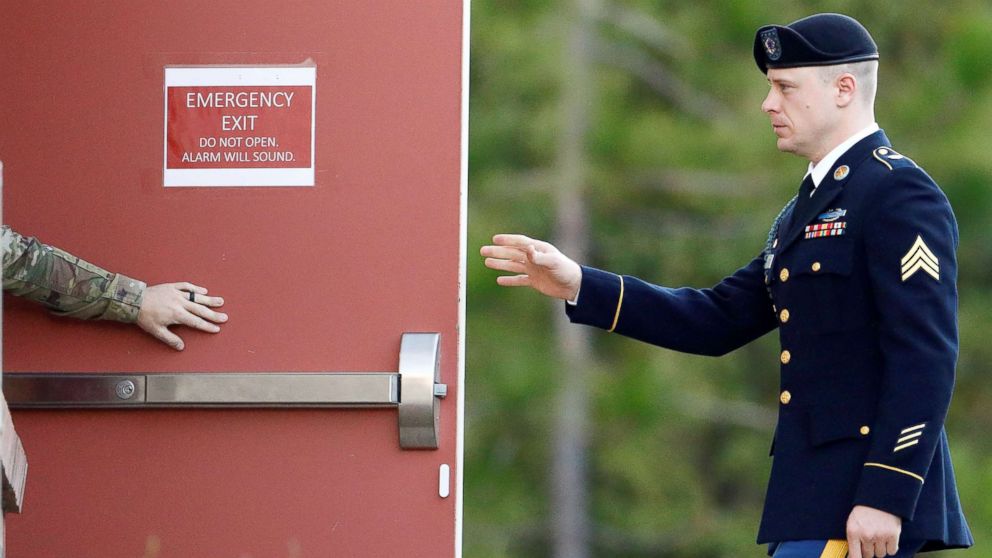





After days of emotional testimony about fellow soldiers who were injured or killed in the aftermath of his disappearance, Sgt. Bowe Bergdahl‘s defense team brought in its own troops to describe the man who walked off his base and the man who came home.
In its second day of witness testimony, Bergdahl’s lawyers brought in a fellow soldier who talked about the quiet young man who “executed quickly” but had trouble adjusting to deployment, as well as a defense official and an intelligence analyst who argued that Bergdahl had become “completely invaluable” and “a gold mine” to U.S. Armed Forces.
Bergdahl faces up to life in prison after he pleaded guilty to desertion and misbehavior before the enemy for abandoning his Army post in Afghanistan in June 2009. Captured by the Taliban and held for five years, he was freed in a prisoner exchange between the militant group and the Obama administration in May 2014.
The trial is now in the sentencing phase for the 31-year old from Sun Valley, Idaho, who took the stand for the two hours on Monday and described in unsworn testimony his brutal time in captivity. The military judge, Army Col. Jeffery Nance, ruled that morning that President Donald Trump’s disparaging comments about the man candidate Trump called a “traitor” and suggested be executed will be a mitigating factor in his sentencing.
Bergdahl’s lawyers hope that the accounts of their three witnesses today will also help reduce his punishment.
John Leatherman, a U.S. Border Patrol agent who was in Berghdal’s unit in Afghanistan and was stationed with him in Alaska, described an efficient and quiet Bergdahl who was a great squad assault weapon gunner, always had his handbook with him and clearly wanted to “better himself.”
“He didn’t seem to adjust as quickly and smoothly as most soldiers adjust. Something about him was a little bit slower coming to terms with what was happening,” Leatherman said in court today, adding that he mentioned this to their first sergeant and asked about getting help for Bergdahl. But the first sergeant told him to shut up and to not tell him how to handle his soldiers — a sign of the stigma associated with asking for mental health help, according to Leatherman.
Terrence Russell of the Joint Personnel Recovery Agency, or JPRA, was the second witness to take the stand, describing how Bergdahl was very helpful and very anxious to get information out to help other prisoners of war.
Russell spoke about the extreme torture and abuse Bergdahl faced in captivity. “His muscles atrophied to the point he could barely stand up…. He was living in filth,” he said. “It was extreme neglect. They just let him nearly rot inside that cage for four years.”
Bergdahl’s accounts of his time in captivity have been extremely helpful to the military’s training of other soldiers, Russell said, because no other soldier has ever been captured and returned in 16 years of war in Afghanistan.
“Can you give him to me tomorrow? I need him. I need him now. Honestly, I needed him three years ago. I need that information,” Russell said.
A third defense witness — Amber Dock, an intelligence analyst who reported to U.S. Central Command during Berghdal’s disappearance — made the same case.
Dock, who was the lead analyst on Berghdal’s case, said the information he provided “was a gold mine. It reshaped the way we did intel in the area. It confirmed what we knew and what we did not know.”
In particular, it allowed the U.S. military to reconstruct the captors’ network and better identify what a hostage location might look like — “completely invaluable,” Dock said, describing Bergdahl as “very eager to help and seemed to understand the urgency of getting the needed information right away to get back to the battlefield.”
After so many years of following his case, she also described the shock of seeing him in Germany for the first time after his release.
“He was very pale, meek. He walked slowly and with caution. It was actually a bit disturbing,” she told the court, noting his voice was “very weak, disjointed, often could not find the words. He had a hard time with timelines. He couldn’t focus very well.”
The tone and substance of their testimony contrasted strongly with witnesses from the prosecution, who had testified in the days prior about how Bergdahl’s disappearance put soldiers at risk.
Jonathan Morita, whose hand was shattered by a rocket-propelled grenade in an ambush while out on a search mission, described the pain and difficulty in emotional detail last week. On Monday, Shannon Allen described the “minimally conscious state” her husband, Master Sgt. Mark Allen, has been in since he was shot in the head by insurgents during an attack. Doctors had to remove both his frontal lobes, leaving him unable to speak and with extremely limited mobility.
“He lost me as a wife because I have become his caregiver,” she added in tears, noting that he cannot be left alone because he’s prone to seizures. “We can’t even hold hands anymore without me prying open his.”
Bergdahl apologized in the afternoon session of court after Shannon Allen’s emotional testimony.
“Saying I’m sorry isn’t enough. My words can’t take away the pain that people have been through,” he said, at times in tears as well. “I was trying to help, and the fact that I did not breaks my heart.”
The defense continues its case Tuesday afternoon and expects to be done with witness testimony on Wednesday. After closing arguments, the case will then be in Judge Nance’s hands, with a decision possibly as soon as the end of this week.

